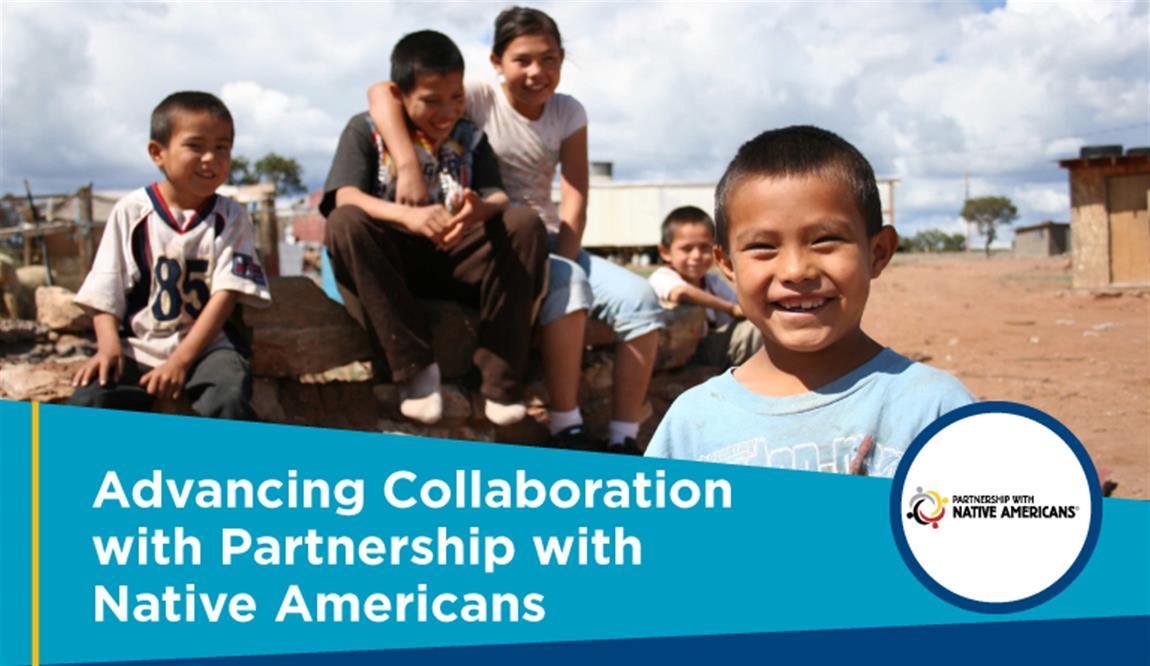Partnership With Native Americans is an organization “committed to championing hope for a brighter future for Native Americans living on remote, isolated and impoverished reservations.”1
Featured Guests:


Rafael Tapia Jr.,
Vice President of Programs


Mark Ford,
Director of Gifts & Partnerships


Helen Oliff,
Public Relations Manager
Approach to Collaboration
As a member of the National Voluntary Organizations Active in Disasters (VOAD), Partnership with Native Americans (PWNA) has collaborated with VOAD members on several occasions, working with tribes affected by disasters, delivering supplies and materials, and identifying opportunities to work together in supporting those tribes.
PWNA has received funding for emergency preparedness activities for communities and reservations in its service area. With the support of Margaret A. Cargill Philanthropies, PWNA also connected with trainers and collaborators, like American Red Cross, Salvation Army, VOAD and others, that enabled capacity building for communities to be self-sustaining and locally prepared to face disasters.
In another collaborative venture with PepsiCo., which has the Native American employee group RISE, they created mentorship opportunities for Native American students that receive scholarships from PWNA. Annually, PWNA provides around 200 scholarships to Native American students and assists K-12 classrooms as well.
PWNA also trains, prepares, and connects organizations that are interested in working in Native American communities, focusing on aspects of history, culture, and self-determination that are vital to working in Indian Country.
These collaborations have expanded PWNA’s impact on tribal communities, allowing for an improved response to immediate needs as well as long-term solutions.
It is also important to highlight that PWNA sees its beneficiaries as collaborators. PWNA partners with tribal programs on remote reservations and supports their work on behalf of tribal citizens.
For the nonprofit sector, PWNA highlights the importance of involving customers directly in the delivery of services. This builds capacity and allows community members to have a role in helping their own communities. It is also very important to know the history of the people one serves, to better understand their real needs and priorities. In addition, PWNA recommends nonprofit organizations be more open-minded regarding collaborations, bearing in mind that the important thing is to serve the beneficiaries, beyond any benefit for the organization itself.
Application of the 9 Considerations for Collaboration
Build Trust
For PWNA, the bottom line to building trust with collaborators comes back to honoring the self-determined goals and priorities of the communities they serve. PWNA also created accountability scenarios with reservation partners as part of their working relationships, where partners must fulfill a request process, a delivery process, and then a reporting process. Often, PWNA also has staff on the ground, working side by side with their partners, to support partners in meeting their program and project goals.
Additionally, it is very important that PWNA and its partners and funders are aligned in their values and are not involved in activities that may counter the interests of Native American communities. This is very important to ensure trust within the communities they serve and other partners with which they collaborate. Finally, PWNA’s work with other organizations helps build trust between these organizations and the communities served.
Have a Vision
As mentioned above, PWNA’s work is guided by the priorities of the tribal communities they serve. Its collaborations are rooted in this vision and aim to support communities in achieving their own self-determined goals.
Seek to Assure the Success of Collaborators
PWNA celebrates the success of its partners as a step toward their vision of helping Native American communities become stronger and more self-sufficient. For example, there are community members who have been trained for emergency preparedness and who are now trainers for others. With this experience and knowledge, trainers see themselves as a resource for their communities, and this type of outcome is a success for PWNA.
In another example, one of the participants in PWNA’s leadership development program, a newly appointed executive director, lost funding for the reservation and its Boys & Girls Clubs branch. So, grants management and grant writing became one of the topics of discussion in the leadership program. PWNA’s consultants worked with the executive director to secure funding for the reservation and keep the Boys & Girls Clubs branch open. Successfully securing this funding with the participant was a shared win for PWNA, too.
Take Stock
PWNA takes stock of the resources available in the communities they serve at different levels, including personal, organizational, and community level. After assessing a community’s resources, PWNA can appropriately collaborate on a plan with the community to help address its priorities.
Start Small
With feedback and support from reservation partners, PWNA started and piloted the 4 Directions Development Program (4D). This is a training program for participants to identify personal and professional goals and work with mentors to attain them.
Fail Fast, and Build Rigorous Feedback Loops
The 4 Directions Development used feedback loops to test the program and define its features. A similar approach to testing and feedback was used to develop PWNA’s Train-the-Trainer (T3) Nutrition program.
Take a Portfolio Approach
As previously discussed, PWNA has a broad portfolio of collaborations. Its partnerships are chosen based on a framework across services and focus areas. Its six pillars of services are health, food and water, animal welfare, emergency services, education, and holiday support. Its focus outcome areas are based on capacity building, education, and community investment.
Consider Non-traditional Partners
PWNA’s relationship with TOMS, a retailer known for the One for One movement, is an example of an unexpected partner that has allowed PWNA to expand its services. PWNA was TOMS’ first domestic giving partner and receives shoes they distribute to enhance back-to-school readiness for students.
Keep Your Donors Apprised of Your Collaborations
PWNA sends reports, pictures, and information about recent activities to donors. As a result of its demonstrated impact, PWNA has seen an increase in grant funding as well as the attention of some celebrities.
Future Collaborations
In the future, PWNA would like to partner with a well-known talk show such as The View or Ellen Degeneris, a program with the gravitas and audience to significantly raise awareness about Native American history and realities and to build popular support for Native causes. Also, collaborations with the Gates Foundation or other foundations focused on health would make for great partners in a campaign to promote food sovereignty and health.
1 http://www.nativepartnership.org/site/PageServer?pagename=pwna_who_we_are

